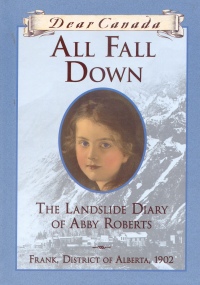| ________________
CM . . .
. Volume XX Number 19. . . .January 17, 2014
excerpt:
All Fall Down is the latest installment of the popular “Dear Canada” series. Here, readers are propelled back to the early twentieth century, starting with a depiction of the heroine’s early years in Montréal and her family’s relocation to the small town of Frank, North-West Territories. The book begins with a hook that is sure to be successful in capturing the attention of the reader, as Abby, the 12-year-old heroine, writes in her diary, “This morning my father was killed.” And so begins the unraveling of a story of a family in turmoil – not only in the natural disaster they later find themselves in – but also due to the heavy topics of sibling rivalry and emotional abuse by a parent. After learning that her father left little money to spare, Abby’s family relocates to Frank, a small mining town, to help Abby’s uncle run his newly established hotel. Abby experiences many adventures, including a return to school (she had been home-schooled in Montréal), new friendships with the inhabitants of the town, including with a girl from a nearby First Nation settlement, and learning to work the telegraph machine – the hot technology of the day. Not all of her experiences are rosy, however. Abby encounters prejudice against her younger brother who was born with Down Syndrome, racism against her best friend, and mean-spiritedness from her siblings. The majority of the book describes her everyday experiences living in a small, newly-settled town in the West. But what happens approximately three-quarters into the book gives it its name – Abby suffers through the disaster of the Frank slide when a portion of Turtle Mountain collapsed, raining huge boulders onto the mine and part of the town, killing many. Abby maintains her cool throughout the event and “records” it eloquently and with the idea of giving the reader a bird’s eye view of the inhabitants’ responses to the disaster. Despite the tragedy, the book ends on a positive note, with a forward view into the future lives of the main characters. Rarely is a review written where not even one criticism is mentioned; this book is near-perfect in its exciting plot lines, writing style, characterization, and historical facts. Historical fiction can be tricky, for it is tempting to insert small, seemingly insignificant references that are not applicable to the time period. Here, Little remains true to the genre, using turns of phrase from the time period, descriptions of the different work carried out by men and women, and even employing what we would consider highly offensive and derogatory terms in the voices of unsavory characters. It is this and other elements that, at times, give the book an instructive tone which can be beneficial to the targeted age group. Adults will remark on how society has changed over time – here, child labour, children taking on parental roles, what constitutes child play, and the great fear of diseases our modern society has eradicated, colour their world. Thus is the appeal of historical fiction – the reader can descend back through time, smugly insisting that humans have conquered all of the ailments of the past. However, one read of Little’s book will show that this is not exactly true for the themes of family disputes, strained relations with Aboriginal peoples, and the fear of natural disasters occur to this day. Little’s genius shows here – the reader will be able to relate to several of the themes woven throughout the book. It is also refreshing to read a narrative account (albeit fictional) of a natural disaster instead of a series of disjointed Tweets, as in our modern experience. Readers will also appreciate the extensive supplementary material, including an historical note, reproductions of archival photographs, a message for readers to decipher in Morse Code (along with the key), and a map. These add credibility to the story, showcasing Little’s extensive research, and are sure to spark further projects to be undertaken by engaged readers. Although it appears that this book (and the series in general) is intended for girls, it is highly readable and will be enjoyed by everyone, including adults. All Fall Down is a must-have for all libraries collecting for this age group. Highly Recommended. Roxy Garstad is the Collection Assessment Librarian at MacEwan University in Edmonton, AB.
To comment
on this title or this review, send mail to cm@umanitoba.ca.
Copyright © the Manitoba Library Association. Reproduction for personal
use is permitted only if this copyright notice is maintained. Any
other reproduction is prohibited without permission.
NEXT REVIEW |
TABLE OF CONTENTS FOR THIS ISSUE
- January 17, 2014.
AUTHORS |
TITLES |
MEDIA REVIEWS |
PROFILES |
BACK ISSUES |
SEARCH |
CMARCHIVE |
HOME |
